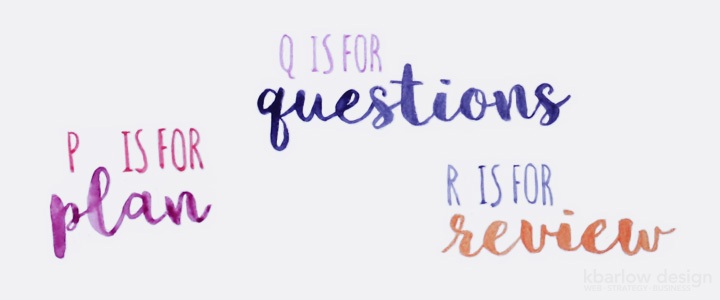P is for Plan:
“If you fail to plan, you plan to fail.”
Harsh words (somewhat edited from Benjamin Franklin), but also true.
Planning doesn’t guarantee success, but it gives you somewhere to start, and something to learn from – namely, what did and did not work. I love to plan, organize, and come up with strategies to test out. I tweak what worked, what didn’t, and keep at it, trying for better results, sometimes taking risks that don’t pan out, but learning from that too. If you don’t make a plan, you aren’t giving yourself the chance to learn from the results. Much like goal setting, it can definitely be overwhelming, but it applies the same way – having an overall plan, and breaking it down into smaller, more manageable pieces so every aspect is accounted for and can be tracked and analyzed so you’re moving forward in a positive direction.
It all starts with your business plan. Once you cover each aspect of your business there (your target market, operations, systems, marketing, sales, etc.), you can keep going back to it to make sure that your marketing matches your target audience, and your marketing efforts are matching your sales goals. Your business plan should be revised annually with your new goals, new things you learned about your ideal client, new trends and technologies that will affect your business and your marketing, and identify where your business has grown, and which direction it should be going in.
So plan to succeed! … or at least to learn from it and confidently move forward.
Q is for Questions:
As a designer, an important part of figuring out the best recommendations I can give my clients is asking the right questions. I ask a variety of questions, some of which can seem vague, but they give me great clues to put into words the style, tone, and message for the design and functionality. I’ve heard a number of times from clients wondering about why I ask something, but the more they talk about their answer, the faster they catch on – it’s to cover different angles to get a clear picture of what they’re looking for, without them having to sit down and try to write it all out from scratch. They go through some questions – and it’s suddenly all laid out for them. One of the best tools I use for this system is templates. I improve on them when I see opportunity, but having my questions all set to go in a template saves loads of time and having frequently asked questions pre-answered saves time too!
No matter what type of business you run, you’ll always get questions from your customers – save yourself some time and write out the answers to your most frequently asked questions and add it to your website!
Go one step further, and ask yourself what other questions your clients might have, and look at how your site is set up – are there areas that are adding to confusion? Could you have more information, or more concise information on certain pages? An in depth Website Analysis could be the answer!
R is for Review:
Reviewing for marketing: Take the time to look back at how your business, marketing, sales, etc. have gone over the past weeks and months. Compare it to months prior, and make notes on what got attention, and what didn’t. If you’re new to business, or you haven’t been tracking how your marketing is doing, take the time to set up your systems properly from the start so you can use this valuable information as to what your target market is looking for, and what didn’t resonate with them.
Reviewing your business plan: Your business evolves every year due to changing trends, technology, and target markets. It’s important to recognize these changes, and have a plan to make your business thrive in the positive and survive and overcome the challenges. Identifying these annual changes will help highlight weaknesses that can be turned into strengths, and help to push the strengths even further to create goals that will grow your business based on what’s already been working for you.


